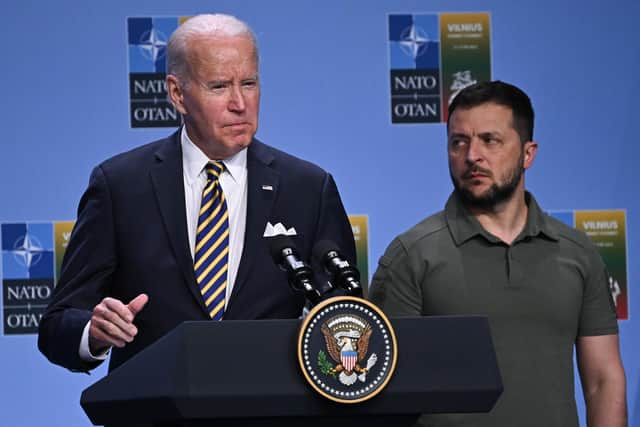As Democrats and Republicans in the US bicker, Ukraine continues to suffer - Patrick Mercer
So serious has the crisis become that Bankova Street (Kiev’s Westminster) is now suggesting that some pensions and benefit payments will have to be suspended.
The trouble is that the vast bulk of the money comes from the US where future tranches are jammed in the Senate whilst the Republicans, who hold the whip hand, have refused to release the funds until the Biden administration directs more money towards the control of illegal immigrants.
Advertisement
Hide AdAdvertisement
Hide AdThis wrangle will probably be overcome in the next few weeks: meanwhile Ukraine suffers. There’s talk of the EU nations giving money, not as much as the US, but enough to tide Kiev over, but Victor Orban of Hungary has vetoed that. It may be that individual EU members can contribute, but again, that will not be enough to stem the Russians whilst President Putin, of course, now sees a fairly short window to push his advantage as Ukraine is unsupported and necessarily pulling back to save men and ammunition.


So, I have no doubt that the Russian election in March will see a crescendo of assaults as the Special Military Operation is going to be front and centre of Mr Putin’s election campaign (the result of which is hardly in doubt). Now, this may be cynical, but one of my predictions for 2024 is that, despite all the advantages of overwhelming numbers, vehicles, aircraft and hardware that Russia enjoys - as well as Kiev’s funding crisis - the Kremlin will stay its hand in March. Yes, there will be a stunt to grab the headlines - the capture of Avdivka perhaps - and Ukraine will try something equally eye catching, probably on the day before voting starts - but it won’t be conclusive.
I think that the final act is already covertly being planned jointly by the White House and Kremlin. I suspect that sometime before the US election - timed for November 5 - that both Presidents will caste themselves as peacemakers, heralding a ceasefire in Ukraine. Whether Mr Zelensky will want that is, I’d suggest, hardly relevant - he may even become the third leg of the triumphant trio - but whatever the US decides he will do without argument.
And, as Western funding fails, think about this. The main article of faith of Western foreign policy since at least February 2022 has been that President Putin must be stopped in Ukraine if his further ambitions are to be resisted. The argument rests on who’s next to feel the tread of Moscow’s boot, so Russia must be fought by the Ukrainian proxy: if that doesn’t happen, Poland, Lithuania or other NATO countries may end up being targeted. Now that’s a reasonable fear, but it’s only realistic if NATO does something to prepare herself for war and there’s almost no sign of that. Except Poland who has mobilised and Denmark, Latvia and Lithuania who have increased their conscription levels, not much has changed. Certainly, fresh battle groups have been deployed to the Alliance’s borders and some US formations have been based on the Black Sea coastline, but these are not newly raised forces.
Advertisement
Hide AdAdvertisement
Hide AdThere’s been a lot of talk, of course. Holland’s military boss suggested last week that his army should move to a war footing, whilst our Chief of the General Staff (CGS) warned the army to be ready for war back in 2022, but both men are soldiers, not politicians - the people in charge. Indeed, so much notice did Whitehall take of the CGS that the British army was reduced by 10,000 and now we hear that two assault ships are to be mothballed - a move that threatens the very existence of the Royal Marines.
Similarly, there has been little sign that the Western military think tanks have done any great analysis of the style of war that has evolved in Ukraine. NATO talks about nothing other than ‘manoeuvre warfare’. This means that agile, mobile forces - often smaller and more nimble than the foes they face, endeavour to surprise an enemy and then exploit their advantage with speed and concentration of firepower.
This is the touchstone of all the Western military schools - but it hasn’t worked in Ukraine: Russian intelligence indicated when and where attacks were planned and then the use of satellites, surveillance aircraft, sensors and drones made surprise impossible. Yet, despite the debacle of Ukraine’s summer offensive (which was certainly planned and directed by NATO officers) Western tactical doctrine has barely changed: our generals are still banging on about tactics designed decades ago.
On top of this, NATO has pretty well run out of ammunition and materiel having given most of their war stocks to Kiev. That might be an acceptable risk if the Western economies had dedicated large portions of our industry towards the production of weapons, but that hasn’t happened. What we need is the same sort of energy which saw the production of PPE and vaccinations during COVID, but there’s absolutely no sign of it. It’s hard to take NATO seriously now. A cynic might say that all the talk about Alliance nations being crushed by the Russian bear unless Ukraine is bolstered and ultimately saved is just nonsense. That same cynic might also use that old and hackneyed phrase that NATO is willing to fight - willing to fight to the very last Ukrainian.
I pray that the fighting stops in Ukraine in 2024 and I think that it will. The result, though, will not be pretty.
Patrick Mercer is a former MP for Newark and Army colonel.
Comment Guidelines
National World encourages reader discussion on our stories. User feedback, insights and back-and-forth exchanges add a rich layer of context to reporting. Please review our Community Guidelines before commenting.